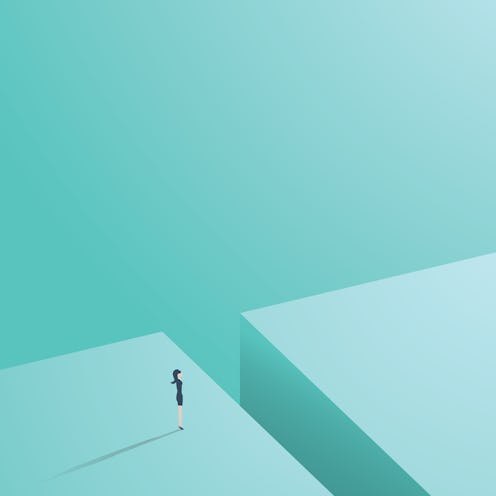
It has long been known that women suffer from higher levels of depression and anxiety than men, and like many gender differences, this discrepancy has frequently been attributed to biology. But a recent study suggests another culprit — or at least another significant factor: The wage gap contributes to women's anxiety and depression. After all, let's face it: Women getting paid less than men is pretty depressing and anxiety-provoking.
The study, conducted at Columbia University's Mailman School of Public Health and published in Social Science & Medicine, found that women's depression and anxiety levels correlate with the difference between their earnings and those of men with similar work experience and education levels. While it's true that correlation is not causation, the effect was still drastic and therefore notable: Women with lower earnings than comparable men were 2.5 times more likely than men to be depressed. Women whose incomes equaled or exceeded those of their male counterparts had the same levels of depression as men did. That's right — the wage gap accounted entirely for gender differences in depression.
For generalized anxiety disorder, the results were similar: Women were four times as likely as men to have suffered from anxiety over the past year when they were victims of the wage gap.
"If women internalize these negative experiences as reflective of inferior merit, rather than the result of discrimination, they may be at increased risk for depression and anxiety disorders," said the study's lead author Jonathan Platt in a press release.
Additionally, senior author Katherine Keyes said that "while it is commonly believed that gender differences in depression and anxiety are biologically rooted, these results suggest that such differences are much more socially constructed that previously thought, indicating that gender disparities in psychiatric disorders are malleable and arise from unfair treatment."
Other studies have indicated that depression and anxiety are, at least to an extent, influenced by societal gender roles. According to research published in the Journal of the American Academy of Child and Adolescent Psychiatry, girls and boys are equally anxious until around age 11, yet girls are six times as anxious by age 15. Why? "There's quite a lot of evidence that little girls who exhibit shyness or anxiety are reinforced for it, whereas little boys who exhibit that behavior might even be punished for it," anxiety expert Michelle Craske told Slate. In other words, we make a big deal out of girls' troubles while we teach boys to toughen up.
Taylor Clarke pointed out in the same Slate article that people consider women (and women consider themselves) more emotional than men, leading to more diagnoses, even when women complain of physical symptoms like chest pain. On top of that, our culture of toxic masculinity discourages men from discussing mental health or seeing a therapist, which could lead men who are anxious or depressed to go undiagnosed.
Lastly, the pressures of being a woman in our society can be anxiety-inducing in of themselves. Ally Boguhn wrote of her anxiety in Everyday Feminism: "a lot of the stressors that impact me the most are actually stressors put upon women by society to look and act in certain ways. Some of my biggest stressors have always been about what others think of me: my appearance, my weight, my accomplishments." Women are more likely to dislike their bodies, for example, and that's a stressor right there.
"Considering that on the whole, women are paid less, find it harder to advance in a career, have to juggle multiple roles and are bombarded with images of apparent female 'perfection,' it would be amazing if there wasn't some emotional cost," Daniel and Jason Freeman, authors of The Stressed Sex: Uncovering the Truth about Men, Women and Mental Health, wrote in Time.
The depression and anxiety gap is one of many examples of gender differences we need to stop dismissing so quickly as natural. When we attribute these discrepancies to biology, we overlook the structural oppression that contributes to them, which masks how harmful these injustices are.
It shouldn't be surprising to us that women and LGBT people are more anxious and depressed. Sexism, homophobia, and other forms of discrimination are not abstract concepts but phenomena that affect us every day. It's no wonder women have higher levels of anxiety and depression when being a woman in our society is just plain anxiety-provoking and depressing.
Images: Fotolia; Giphy(5)